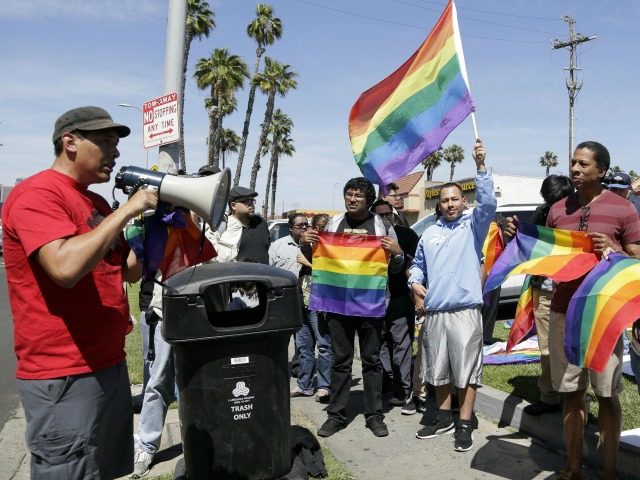Many major corporations are partnering with progressive groups who attack the various foundational rules of Americans’ civic society, such as family autonomy, free expression, sexual caution and even the little-noticed expectation of single-sex bathrooms.
These partnerships are political trades, in which the companies agree to loudly support U.S. progressive groups — so long as the progressive groups and President Barack Obama’s regulators do not cause trouble for company revenues and profits.
The Heritage Foundation’s website, DailySignal.com, helpfully provides a list of 16 major companies that happily do business in countries with terrible human-right records — but which are now working with progressives to attack U.S. state legislation that would affirm the privacy of single-sex bathrooms and changing rooms.
The legislation is intended to block the progressives’ far-reaching demand that all Americans agree that their single-sex bathrooms be opened up to opposite-sex transgender people. If that victory is accomplished, it would mark another concession to the progressives’ insistence that there’s no significant differences between men and women, or between boys and girls.
These corporations’ double-standards are not hypocritical — they’re just business. Many of the companies would largely ignore the U.S. progressive groups if they weren’t afraid of their domestic power. They would also stand up for civic rights overseas if it was profitable. But what is hypocritical is the holier-than-thou virtue signaling by the company executives — especially those at Intel, which recently announced plans to fire 12,000 U.S. professionals.
Naturally, as part of the corporate-progressive partnership, progressives remain silent about Intel’s pending layoffs.
16 ‘Pro-LGBT’ Businesses That Operate in Countries With Poor Human Rights Records.
Big corporations have come out to criticize state religious liberty measures in Georgia, Mississippi, and North Carolina as discriminating against those who aren’t heterosexual, some going as far as to propose boycotting states that enact such laws.
However, several of the most vocal companies that say they stand with lesbian, gay, bisexual, and transgender (LGBT) Americans also operate in countries with troubling human rights records, including places where homosexuality can result in a death sentence, a review by The Daily Signal shows.
Details on the fate of the measures in Georgia, Mississippi, and North Carolina are below. The following is a list of 16 corporations that publicly attacked religious liberty measures in one or more of the three states, yet do business in countries that blatantly and sometimes brutally discriminate against LGBT citizens or otherwise have a poor record of defending human rights:
1. Unilever
Unilever CEO Paul Polman tweeted that many businesses would boycott Georgia if its HB 757 religious liberty bill were signed by the governor:
The multinational corporation earned top marks by the Human Rights Campaign, one of the nation’s most influential gay rights groups, in what it calls its 2016 Corporate Equality Index for LGBT Workplace Equality.
However, Unilever North Africa Middle East has production facilities in countries such as Tunisia and Algeria. A 2015 report by the International Lesbian, Gay, Bisexual, Trans, and Intersex Association indicates that those countries make homosexual activity illegal.
Unilever did not respond to The Daily Signal’s request for comment.
2. Microsoft
Microsoft President and Chief Legal Officer Brad Smith tweeted that he supported opposition to Georgia’s HB 757.
The tech giant complies with government search engine censorship policies in China, according to Human Rights Watch. Microsoft and other search engine companies argue that just by operating within the borders of the communist state, they make China freer.
A corporate document describes freedom of expression as a fundamental right, but states “restrictions on free expression and privacy should only be imposed where necessary, narrowly tailored and provided for by law—and we are opposed to restrictions on peaceful political expression.”
>>> Big Businesses Side With LGBT Activists Against Georgia’s Religious Liberty Bill
Microsoft did not respond to The Daily Signal’s request for comment.
3. Intel
Intel CEO Brian Krzanich tweeted in opposition to the Georgia bill:
Intel has partnered with the Vietnamese government to develop education, environment, and “digital inclusion programs.” Human Rights Watch describes Vietnam as a one-party communist state that “bans all independent political parties, labor unions, and human rights organizations.”
Like Microsoft, Intel says it bases its human rights policies on United Nations standards to “avoid complicity in human right violations related to our own operations, our supply chain, and our products.”
Intel did not respond to The Daily Signal’s request for comment.
Read the rest here.

COMMENTS
Please let us know if you're having issues with commenting.